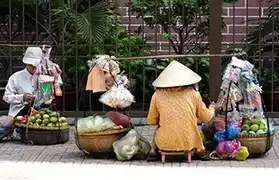Learn Vietnamese easily and fast
Learn Vietnamese fast and easily with our language course ‘Vietnamese for beginners’.
![em]() English (US]
»
English (US]
»
![vi.png]() Việt
Việt
| Learn Vietnamese - First words | ||
|---|---|---|
| Hi! | Xin chào! | |
| Hello! | Xin chào! | |
| How are you? | Khỏe không? | |
| Good bye! | Hẹn gặp lại nhé! | |
| See you soon! | Hẹn sớm gặp lại nhé! | |
Why should you learn Vietnamese?
Learning Vietnamese opens a window to the rich culture and history of Vietnam. This Southeast Asian country offers a fascinating blend of traditions and modernity, which becomes more accessible when you understand the language. Vietnamese is the key to exploring Vietnam’s stunning landscapes, from bustling cities to serene countryside. Speaking the language enhances travel experiences, allowing for deeper interactions with locals and a fuller appreciation of Vietnam’s beauty.
Understanding Vietnamese can benefit those interested in business opportunities. With Vietnam’s economy growing rapidly, proficiency in the language provides a competitive edge in sectors like manufacturing, technology, and tourism. The language offers direct access to Vietnam’s literary and cinematic works. Vietnamese literature and films are rich in cultural insights, and experiencing them in their original language captures nuances that translations might miss.
Learning Vietnamese is also beneficial for personal growth. It challenges your brain, improving cognitive skills such as memory, attention, and problem-solving. The tonal nature of Vietnamese provides a unique linguistic challenge. Vietnamese cuisine is renowned worldwide for its flavors and diversity. Knowing the language allows you to explore the culinary landscape more deeply, from reading menus to understanding recipes and communicating with local chefs.
For those with Vietnamese heritage, learning the language strengthens connections to family and roots. It bridges generations, enabling more meaningful conversations and understanding of cultural practices and history. Engaging with Vietnamese communities, both in Vietnam and abroad, becomes more rewarding when you speak the language. It fosters deeper connections, mutual respect, and a shared sense of identity, enriching your social and cultural life.
Even Vietnamese beginners can learn Vietnamese efficiently with ‘50LANGUAGES’ through the practical sentences. First you will get to know the basic structures of the language. Sample dialogues help you to express yourself in the foreign language. Prior knowledge is not required.
Even advanced learners can repeat and consolidate what they have learned. You learn correct and frequently spoken sentences and you can use them immediately. You will be able to communicate in everyday situations. Use your lunch break or time in traffic to learn a few minutes of Vietnamese. You learn on the go as well as at home.
Learn for free...
Text book - English (USA) - Vietnamese for beginners Learn Vietnamese - First words
Learn Vietnamese with the Android and iPhone app ‘50LANGUAGES’
The Android or iPhone app ‘Learn 50 languages’ is ideal for all those who want to learn offline. The app is available for Android phones and tablets as well as iPhones and iPads. The apps include all 100 free lessons from the 50LANGUAGES Vietnamese curriculum. All tests and games are included in the app. The MP3 audio files by 50LANGUAGES are a part of our Vietnamese language course. Download all audios for free as MP3 files!








